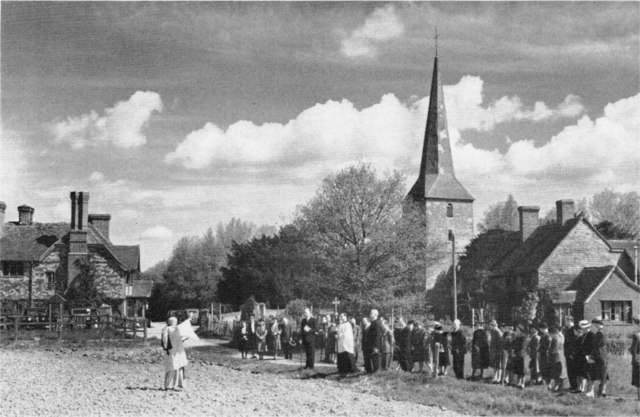 |
| An early photograph of a Rogation Day blessing. |
Ecclesiasticus 38:27-32
Psalm 107:1-9
1 Corinthians 3:10-14
Matthew 6:19-24
In our current Prayer Book the Rogation Days have themes of Agriculture, Commerce and Industry, and Stewardship of Creation. Today being the second of the Rogation Days points us to Commerce and Industry. On this day we pray for and hear readings about these ways of working.
In Ecclesiasticus, we were reminded that artisans, smiths, and potters relied upon their hands to create work. The Psalm focused on the goodness that God produced in the lands to quench thirst and satiate hunger. Paul urged those in Corinth to build not with destructible materials, but with ones that would last. All of these words provide wisdom about how we create, build, and work in this world, but Jesus’ words from Matthew tell us of what economy truly matters.
“Do not store up for yourselves treasures on earth, where moth and rust consume and where thieves break in and steal; but store up for yourselves treasures in heaven, where neither moth nor rust consumes and where thieves do not break in and steal. For where your treasure is, there your heart will be also.” On a day when the Church asks God’s blessing upon our work, these words remind us of our ultimate work. We are called by God to work for the building up of God’s reign, not our own wealth. How do we go about this in a world and a country so dedicated to creating wealth?
In some ways the world Jesus knew was not unlike our own. He may have lived in the rural area of Galilee, but he knew the day’s global economic system. He viewed how the Roman Empire and the religious elite made money off the backs of the poor. Whether it was money changers exploiting Temple sacrifices, Pharisees fleecing widows, or husbands leaving their wives divorced and penniless, Jesus observed that the love of wealth—not wealth itself—was rooted in evil. And, he pointed out the ways through which the rich took advantage of the poor. Thus, he spoke his warning: do not store for yourselves treasures on earth where moth and rust consume and where thieves break in and steal. Still, this warning only gives us half of the equation.
How do we take part in God’s economy? How do we build up treasure not on earth, but in heaven? In previous generations on this day, people would fast, hence the purple penitential color. They did so because they thought that God would bless them for this practice. While fasting has its own spiritual benefits, if we take on this practice because we think God will bless us (here or in heaven) we have it mixed up. Someone wiser than me (the Rev. Robert Wisnewski) told me this sort of spiritual growth—the building up of heavenly treasure—is like making coleslaw not taking something away.
Often we think that the way we grow closer to God is through getting rid of something we deem as bad. I don’t think it’s impossible to follow this path of finding balance, but the analogy of making coleslaw appears more tasty and fruitful. When we want to give more time to God, when we want to store up our wealth in heaven, we would do well to add more of certain ingredients—like when one creates the right balance with coleslaw.
Coleslaw requires chopped cabbage, maybe carrots, perhaps some onion, mayonnaise, a bit of vinegar, and a few spices. When one of those ingredients is out of whack one cannot remove it from the rest. Instead, one must add a little more of the others to create balance. So it is with our spiritual treasure. We may think, I really need to stop doing this thing—and that can definitely be the case. But, adding a much needed ingredient can have a transforming effect that allows us to focus on building up treasure in heaven not here on earth.
Another way of looking at this is how we spend our time, our energy, and our talent. Each month at St. John’s we celebrate a different stewardship focus. This month is the stewardship of time. How do we spend our time? In thinking of my own response I was reminded of two common ways we pray.
First, the liturgy. Liturgy means the work of the people. Our common work is to pray. If we spend our time together praying we quite often discover new ways to build up our treasure.
Second, the Daily Office. We call those prayer services in our Book of Common Prayer the Daily Office because that is where we are called individually and collectively to work. Again our work is prayer.
We may think we do not have time for these prayerful practices, but often when we add these ingredients other parts of life get balanced, like with coleslaw. Our work is of critical importance. But, if we are to take part in God’s economy we will focus on building up treasure not here, but in heaven. We start this by doing the work of prayer as we listen to God, ask God for our needs, and praise God for the response, which is our lives.
No comments:
Post a Comment